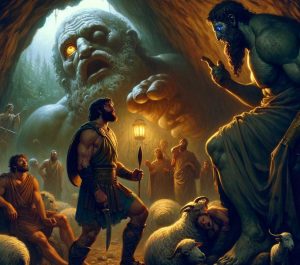Odysseus on the island of the Cyclops Polyphemus

The island is inhabited by the Cyclopes, a race of one-eyed giants who live solitary lives as shepherds, without laws or social structures. Odysseus, driven by curiosity and the hope of hospitality, takes twelve of his best men to explore the island.
They come across a large cave filled with cheese and livestock, the home of Polyphemus, the son of Poseidon. Despite the protests of his men, Odysseus decides to wait in the cave for its owner, hoping to receive a guest-gift.
When Polyphemus returns, he quickly shows himself to be no hospitable host; he blocks the cave’s entrance with a massive stone, trapping Odysseus and his men inside. Polyphemus then proceeds to eat two of Odysseus’s men for his meal. Realizing that direct combat against the giant would be futile, Odysseus devises a plan to escape.
Odysseus tells Polyphemus that his name is “Nobody” and offers the Cyclops strong wine he has brought from his ship. Polyphemus, unaccustomed to wine, quickly becomes drunk and falls asleep. Odysseus and his men then take a wooden stake, previously sharpened and hardened in the fire, and drive it into Polyphemus’s single eye, blinding him.
When Polyphemus cries out in pain, the other Cyclopes come to his aid but are deceived when Polyphemus tells them that “Nobody” is hurting him. They leave, thinking him mad. The next morning, as Polyphemus removes the stone to let his sheep out to graze, Odysseus and his men cling to the undersides of the animals to escape, evading Polyphemus’s attempts to feel for them by only touching the tops of his sheep.
Once they are safely back on their ship, Odysseus cannot resist taunting Polyphemus, revealing his true identity. In his rage and pain, Polyphemus prays to his father, Poseidon, to curse Odysseus, marking the beginning of Odysseus’s prolonged and difficult journey home, fraught with divine retribution.
This episode not only illustrates the cleverness and resourcefulness of Odysseus but also serves as a cautionary tale about the consequences of hubris and the importance of xenia, or hospitality, a fundamental aspect of ancient Greek culture.
